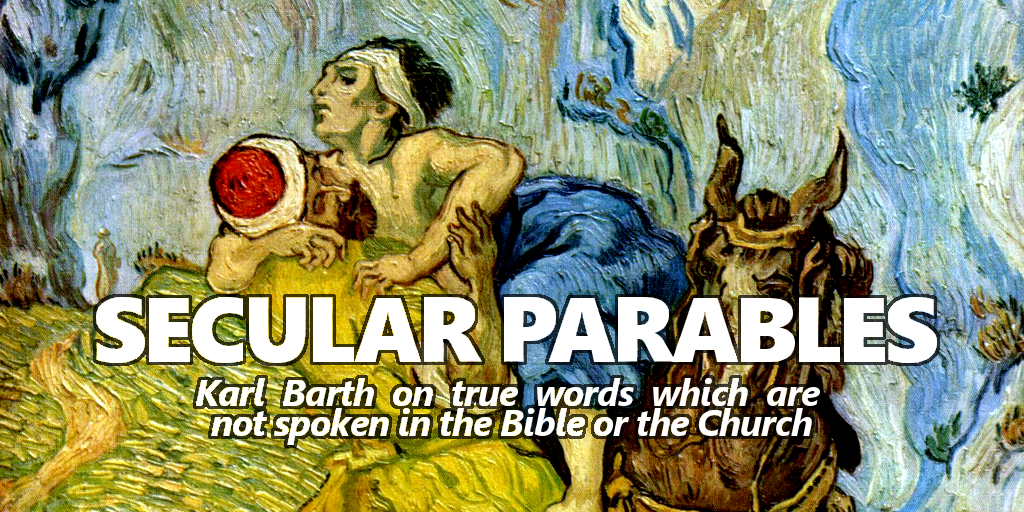 At the end of the Church Dogmatics, Karl Barth took a surprising turn in his affirmation of "secular parables" that made many wonder if Barth had reversed his resounding Nein! to Emil Brunner many years prior. In the Church Dogmatics Vol. IV/3.1, §69.2 "The Light of Life", Barth develops his own "Natural Theology", although Barth does not admit he is doing anything like Natural Theology. Barth makes this clear when he writes: "It will be seen that, in order to perceive that we really have to reckon with such true words from without, we have no need to appeal either for basis or content to the sorry hypothesis of a so-called " natural theology" (Le., a knowledge oi God given in and with the natural force of reason or to be attained in its exercise)." (CD IV/3.1, p.17).
At the end of the Church Dogmatics, Karl Barth took a surprising turn in his affirmation of "secular parables" that made many wonder if Barth had reversed his resounding Nein! to Emil Brunner many years prior. In the Church Dogmatics Vol. IV/3.1, §69.2 "The Light of Life", Barth develops his own "Natural Theology", although Barth does not admit he is doing anything like Natural Theology. Barth makes this clear when he writes: "It will be seen that, in order to perceive that we really have to reckon with such true words from without, we have no need to appeal either for basis or content to the sorry hypothesis of a so-called " natural theology" (Le., a knowledge oi God given in and with the natural force of reason or to be attained in its exercise)." (CD IV/3.1, p.17).
In the following quotation, Karl Barth explains his final word on Natural Revelation in this famous passage defining "secular parables". Barth explains that these secular parables are other lights besides the one light of Jesus Christ. The other lights do not express any other word than the one word, and these other words do not oppose what has been revealed by the Bible or the Church, and do not add anything that has not been revealed. Barth's so-called Natural Revelation in CD IV/3.1 is developed throughout "The Light of Life" paragraph, and I highly recommend this reading to supplement what Barth wrote many years before in the Church Dogmatics Vol. II/1, where his 'No' to 'Natural Revelation' is famously expounded.
Presupposing that this is accepted and confessed, we now turn to the more complicated question of true words which are not spoken in the Bible or the Church, but which have to be regarded as true in relation to the one Word of God, and therefore heard like this Word, and together with it.
Are there really true words, parables of the kingdom, of this very different kind? Does Jesus Christ speak through the medium of such words? The answer is that the community which lives by the one Word of the one Prophet Jesus Christ, and is commissioned and empowered to proclaim this Word of His in the world, not only may but must accept the fact that there are such words and that it must hear them too, notwithstanding its life by this one Word and its commission to preach it. Naturally, there can be no question of words which say anything different from this one Word, but only of those which do materially say what it says, although from a different source and in another tongue. But can it ever pay sufficient attention to this one Word? Can it be content to hear it only from Holy Scripture and then from its own lips and in its own tongue? Should it not be grateful to receive it also from without, in very different human words, in a secular parable, even though it is grounded in and ruled by the biblical, prophetico-apostolic witness to this one Word? Words of this kind cannot be such as overlook or even lead away from the Bible. They can only be those which, in material agreement with it, illumine, accentuate or explain the biblical witness in a particular time and situation, thus confirming it in the deepest sense by helping to make it sure and concretely evident and certain. They can only be words which will lead the community more truly and profoundly than ever before to Scripture. Has it any good reason to refuse this kind of stimulation and direction, whatever its origin or form? In so doing, would it really be obedient to Scripture, which in both Testaments often introduces witnesses to the truth from the darkness of the nations and therefore from outside the community of the elect and called, giving them a serious message to deliver and thus displaying that which is old and familiar in a new guise? Does it not necessarily lead to ossification if the community rejects in advance the existence and word of these alien witnesses to the truth? It must test them by the witness of Scripture. But it must really hear them, although without prejudice to its own mission to preach the one Word of God in its own tongue and manner as grounded in and directed by the biblical witness. We do not refer to words which might tempt it from this task or make it unwilling or incompetent to discharge it.
Barth, Karl. "Church Dogmatics IV/3.1 Study Edition 27" Ed. T. F. Torrance and G.W. Bromiley. IV.3.1 The Doctrine of Reconciliation. Trans. G. W. Bromiley. London: T & T Clark, 2010. 110. Print. [p114-5]



Leave a comment